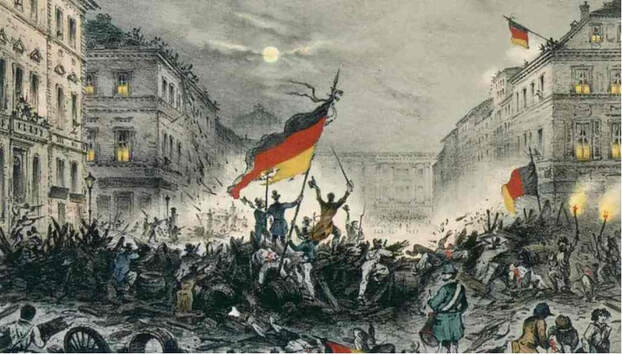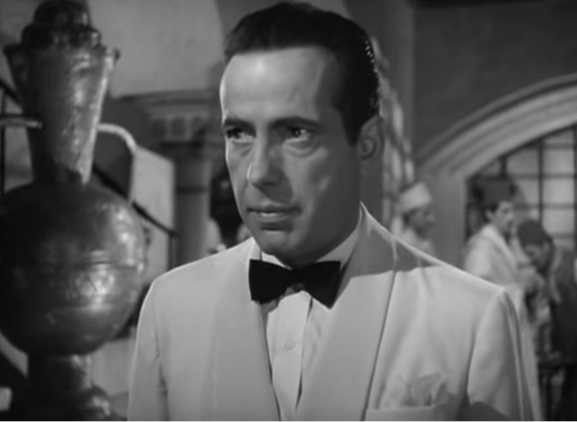|
5/27/2021 Dialectical Power in Art; Communism’s First Anthem, La Marseillaise. By: Tim RussoRead NowIf you’re listening to the fiction audiobook series Ghosts of Plum Run here on Midwestern Marx, you’re learning the Union Army in the American Civil War had a lot of German immigrants in the regiments, especially in the First Minnesota. Company A of the First Minnesota crackled with spoken German constantly, German language newspapers delivered into camp, men writing letters in German. During their suicidal charge at sundown on July 2, 1863 on the second day of the Battle of Gettysburg, more than half of the First Minnesota’s Company A was German born, as were Company A’s killed in action during the 15 minute charge. More than half of Company A’s wounded to later die of their wounds from the charge were German born. While many notable German regiments celebrated their revolutionary German heritage, such as August Willich’s 9th Ohio and 32nd Indiana, most German born immigrants in the Union Army had erased from their history the communist revolutions of 1848 in Europe, leaving it behind and all else of Europe’s endless, tiresome, oppressively complicated dramas that drove them across the sea. America transformed them into newborns, with no past, only a future, but still German. One revolutionary leftover was very visibly (rather, audibly) kept, especially when Willich’s men drilled while the regimental band played the song of the revolution, La Marseillaise. To any outsider, the song was the most observable evidence of the 1848 revolution in the Union Army. La Marseillaise had entered the dialectic, and remains there even today. Composed by Claude Joseph Rouget de Lisle the night of April 25, 1792, La Marseillaise was first known as War Song for the Army of The Rhine. Rouget de Lisle attended a dinner that night hosted by the French mayor of largely German Strasbourg, Philippe Freidrich Dietrich, to honor officers of the French garrison in Strasbourg. Tension gripped Strasbourg, as Austrian and Prussian troops were about to invade to try and smother French revolutionary ideas in their cradle. Over drinks after dinner, Mayor Dietrich lamented to the gathered officers that revolutionary France had no national anthem to motivate armies in the face of the imminent invasion. So, Rouget de Lisle immediately hurried to his quarters to write just such an anthem, returning with sheet music for the mayor himself to sing for the first time in his living room, accompanied by his wife on piano in a late night, wine fueled flurry of music and revolution. Instantly infectious, the song stuck to France like glue. Lyrically, nothing could explode more with viciously revolutionary power, warning of “tyranny’s bloody standard raised” by “bloodthirsty despots”, a “horde of slaves, of traitors and conspiring kings” coming to “cut the throats of your sons and women” and worse, “tear apart their mothers’ breasts.” Sacre bleu! A call to arms was never more direct, itself so bloodthirsty the chorus demands over and over to crescendo, “To arms citizens! Form your battalions! March! March! Let an impure blood water our furrows!” It was first sung on the march mere weeks after its composition, in May, 1792, by volunteers from Marseille, whose entry into Paris that summer, singing the song, gave the anthem its permanent name, La Marseillaise. Translated rapidly into German in defense of the Alsace region against the Austrians and Prussians, La Marseillaise crossed national boundaries very early in its history. Alas, like so many incredibly powerful French revolutionary moments that somehow, someway, crossed some imaginary dialectical line somewhere, La Marseillaise lost favor quite quickly. Seeming to anticipate the danger of what he had done, Rouget de Lisle never signed the sheet music. Mayor Dietrich lost his head at the guillotine only a year later during the Reign of Terror, to be rehabilitated from the grave as a hero of the revolution two years later, when the song was made the French national anthem for the first time in 1795. After Napoleon Bonaparte turned revolution into empire, himself a “despot and conspiring king”, he got rid of the anthem, the succession of hobbled French monarchies after his ignoring the song entirely, with good reason. But the song would not die. It arose again in France’s 1830 revolution, and then most powerfully across the whole of Europe in 1848, sung by every nationality rising up against tottering monarchies across the continent. Revolutionaries who fought with La Marseillaise in their lungs then had to flee their homes as immigrants to America brought the anthem to German regiments in the Union Army in 1861. Back in Europe, Napoleon III threw up his hands in frustration in 1870, and encouraged the song’s return to help raise armies to fight the Franco Prussian War. This of course backfired, as the Paris Commune appropriated the song in 1871, changing the lyrics for communist effect. The commune crushed, buried the song was again until finally, in 1878, La Marseillaise stayed for good as France’s national anthem. The next century, Hollywood found it. Today, the most known version of La Marseillaise appears in what many consider the greatest film ever made, Casablanca (1942), in a scene itself teeming with explosive dialectical irony shooting in every direction. Having commandeered Sam’s piano, uniformed Nazis in Rick’s Café bombastically sing their Nazi approved German anthem, annoying the crowd filled with refugees waiting for visas to flee Europe to America. Instantly, resistor Victor Laszlo (played by Paul Henreid, himself a German refugee) marches to Rick’s house band and demands, “Play La Marseillaise! Play it!” The band leader looks for permission to Rick (Humphrey Bogart) across the room. Bogart nods approval, as if he is the dialectic itself, the barely perceptible nod a cosmic conduit from a boozy late night in 1792, to 1848, to 1861, to 1871, to 1942. The café explodes with La Marseillaise, drowning out the Nazis, who immediately begin a crackdown. Only art possesses such timeless dialectical power, in this case music. One of cinema’s greatest icons Humphrey Bogart likely did not know, as he nodded, that at the Battle of Shiloh, the reddest of the red August Willich calmed his staggered Union troops by drilling them in the manual of arms, under Confederate fire, on his horse, his back to the enemy, their calming rhythm made permanent by previously drilling to the strains of La Marseillaise in camp, over and over again. AuthorTim Russo is author of Ghosts of Plum Run, an ongoing historical fiction series about the charge of the First Minnesota at Gettysburg. Tim's career as an attorney and international relations professional took him to two years living in the former soviet republics, work in Eastern Europe, the West Bank & Gaza, and with the British Labour Party. Tim has had a role in nearly every election cycle in Ohio since 1988, including Bernie Sanders in 2016 and 2020. Tim ran for local office in Cleveland twice, earned his 1993 JD from Case Western Reserve University, and a 2017 masters in international relations from Cleveland State University where he earned his undergraduate degree in political science in 1989. Currently interested in the intersection between Gramscian cultural hegemony and Gandhian nonviolence, Tim is a lifelong Clevelander. Archives May 2021
0 Comments
Leave a Reply. |
Details
Archives
July 2024
Categories
All
|


 RSS Feed
RSS Feed